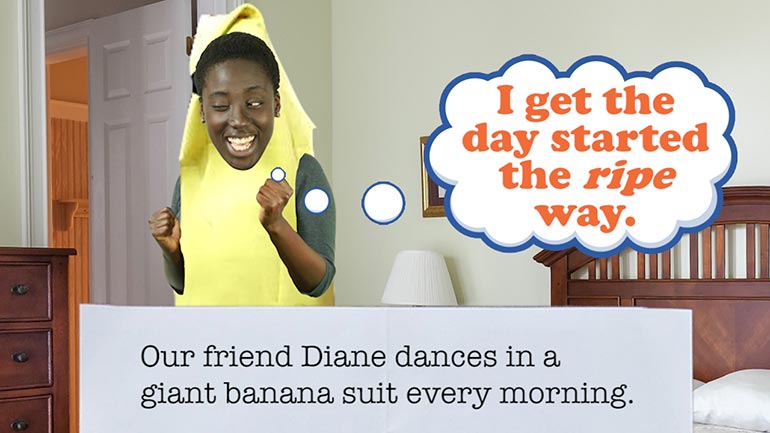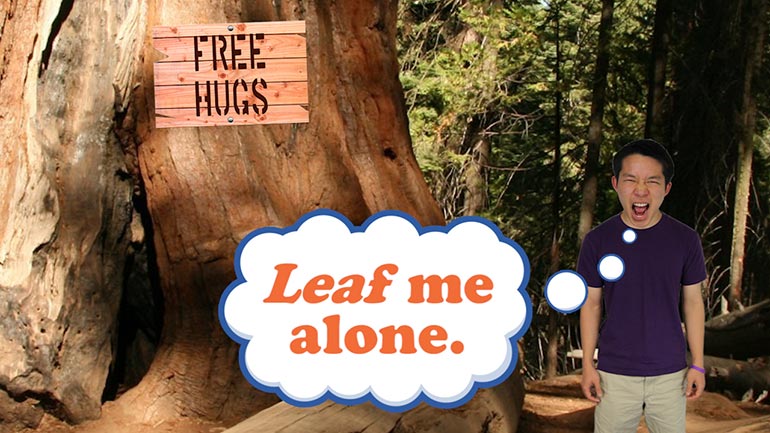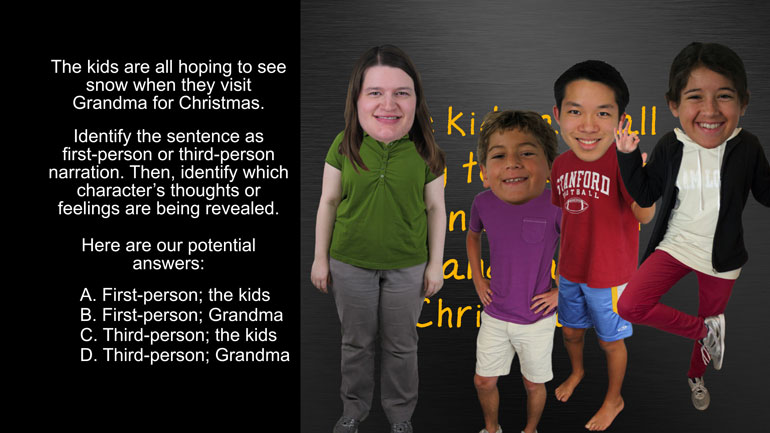ShmoopTube
Where Monty Python meets your 10th grade teacher.
Search Thousands of Shmoop Videos
ELA 4: How Words Can Help 1205 Views
Share It!
Description:
Sticks and stones, right? Well...only sometimes. It's a good idea to make sure your words aren't going to hurt others. Let's look at some ways to do that.
Transcript
- 00:04
[Coop and Dino singing]
- 00:13
Conversations are great. They’re a big part of how we connect to people. [Boy and girl on a see-saw]
- 00:17
“Oh, you love Shmoop? Me, too!” Bam! Instant friendship.
- 00:21
But it’s not always so simple. Sometimes you have a – dun, dun, dun – disagreement. [Girl hurt on the floor]
- 00:27
And then what?
Full Transcript
- 00:28
Well, we’re here to let you know that a disagreement doesn't mean you have to end
- 00:31
your friendship and move to a different city. Follow these tips, and you should be able [Girl packing a suitcase]
- 00:35
to move on… without actually having to move. The first thing to keep in mind is that people
- 00:39
often disagree when they don't share the same opinion. And that's completely fine.
- 00:44
It might not feel great, but it’s okay.
- 00:47
Opinions aren't hard facts that everyone needs to agree on––they're shaped by people's [Coop discussing opinions]
- 00:51
perspectives and their experiences, which means that everybody can have a different
- 00:55
one.
- 00:56
With that in mind, it's always a good idea to hear people out on why they hold certain
- 01:00
opinions. What makes them feel the way that they do? What experiences have they had that [Man and woman in a coffee store]
- 01:05
support that opinion? You'll only find out if you listen.
- 01:09
And that's not just true about other people's opinions, but your own as well. If someone
- 01:13
doesn't agree with you, you should be just as willing to talk them through why you hold [Girl getting a haircut]
- 01:17
that opinion. Even things that are incredibly clear to you might be news to someone else.
- 01:23
And when stating your opinions, it's a good idea to make clear that they are, in fact, [Man sits on a chair by a PC]
- 01:27
opinions. You can do this with phrases like: "In my opinion…" or "In my experience…"
- 01:32
or even "I think that…"
- 01:34
So instead of saying, “Harry OBVIOUSLY should have ended up with Hermione,” just throw
- 01:39
an “I think” in there, and boom: less people will get mad at you.
- 01:42
Well…maybe just stay away from Harry Potter fans in general. They're a pretty loyal bunch. [Person in wizard robes makes man levitate]
- 01:46
That brings us to a very important thing you can do to help navigate your way through a
- 01:51
disagreement: be nice.
- 01:52
Yup. It's that simple.
- 01:54
Disagreements are no excuse to be disagreeable. Sure, it’s easy to get mad and call somebody [Tomato hits man in the face]
- 01:59
a “poop-face,” but… maybe try not to.
- 02:01
Even if it's kind of funny, it’s not very nice and it’s certainly not winning you
- 02:05
any persuasion points.
- 02:06
Because guess what: it’s a lot easier to convince somebody you’re right when they
- 02:10
like you. And if you follow all these steps and still [Coop teaching how to handle disagreements]
- 02:13
don’t reach an agreement, that’s totally fine.
- 02:15
It’s actually a good thing to learn how to do in life. Agree to disagree, get some
- 02:19
ice cream together, and move on.
- 02:21
And one last pro-tip: rocky road is a great flavor for moving past arguments. [Boys ice cream falls on the floor]
- 02:26
But of course, that's just our opinion.
Up Next
Learn to debate like a champ. It's way better than debating like a chimp. That just takes mudslinging to a whole new level.
Related Videos
Today we'll learn about biographies and autobiographies. And no, the second one has nothing to do with the lives of cars.
In this lesson we'll subject you to some verbs and predicates. Each one is a necessary part of a complete breakfas—er...sentence.
Choosing words carefully is important. You may end up vexing the assemblage of citizens you're conversing with...or you might even just plain bore...
ELA Drills, Beginner: Point of View 2. Identify what sort of narration is being used and which character's thoughts or feelings are being revealed.




